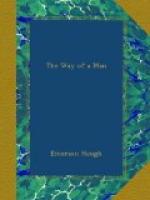“I, Gordon Orme, appoint John Cowles my executor. I ask him to fulfill last request. I give him what property I have on my person for his own. Further, I say not; and being long ago held as dead, I make no bequests as to other property whatsoever.—Gordon Orme. In Virginia, U.S.A.”
It was he, then, who had in cold blood killed my father! That horrid riddle at last was read. In that confession I saw only his intent to give me his last touch of misery and pain. It was some moments before I could read all the puzzle of his speech, half of which had promised me wretchedness, and half happiness. Then slowly I realized what I held in my hand. It was the proof of his guilt, of my innocence. He had robbed me of my father. He had given me—what? At least he had given me a chance. Perhaps Ellen Meriwether would believe!
* * * * *
It was my duty to care for the personal belongings of Gordon Orme; but regarding these matters a soldier does not care to speak. I took from his coat a long, folded leather book. It was hours later, indeed late the following morning, before I looked into it. During the night I was busy making my escape from that fated field. As I came from the rear, mounted, I was supposed to be of the Confederate forces, and so I got through the weary and scattered columns of pursuit, already overloaded with prisoners. By morning I was far on my way toward the Potomac. Then I felt in my pockets, and opened the wallet I had found en Orme’s body.
It held various memoranda, certain writings in cipher, others in foreign characters, pieces of drawings, maps and the like, all of which I destroyed. It contained also, in thin foreign notes, a sum large beyond the belief of what an ordinary officer would carry into battle; and this money, for the time, I felt justified in retaining.
Orme was no ordinary officer. He had his own ways, and his own errand. His secret, however great it was—and at different times I have had reason to believe that men high in power on both sides knew how great it was, and how important to be kept a secret—never became fully known. In all likelihood it was not his business actually to join in the fighting ranks. But so at least it happened that his secret went into the unknown with himself. He was lost as utterly as though he were a dark vision passing into a darker and engulfing night. If I learned more than most regarding him, I am not free to speak. He named no heirs beyond myself. I doubt not it was his wish that he should indeed be held as one who long ago had died.
Should Gordon Orme arise from his grave and front me now, I should hardly feel surprise, for mortal conditions scarce seem to give his dimensions. But should I see him now, I should fear him no more than when I saw him last. His page then was closed in my life forever. It was not for me to understand him. It is not for me to judge him.




